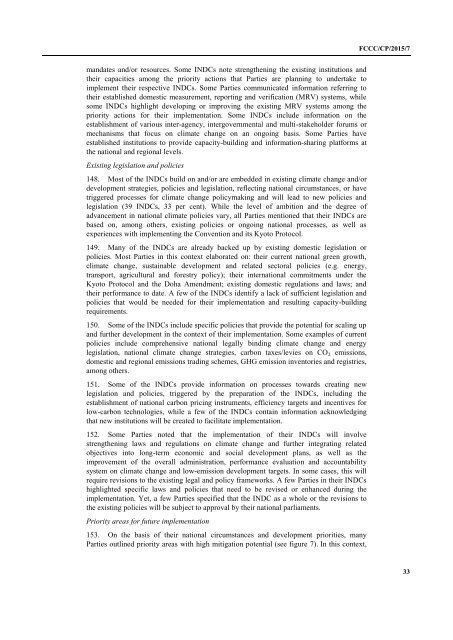FCCC/CP/2015/7
1PYuHQM
1PYuHQM
Create successful ePaper yourself
Turn your PDF publications into a flip-book with our unique Google optimized e-Paper software.
<strong>FCCC</strong>/<strong>CP</strong>/<strong>2015</strong>/7<br />
mandates and/or resources. Some INDCs note strengthening the existing institutions and<br />
their capacities among the priority actions that Parties are planning to undertake to<br />
implement their respective INDCs. Some Parties communicated information referring to<br />
their established domestic measurement, reporting and verification (MRV) systems, while<br />
some INDCs highlight developing or improving the existing MRV systems among the<br />
priority actions for their implementation. Some INDCs include information on the<br />
establishment of various inter-agency, intergovernmental and multi-stakeholder forums or<br />
mechanisms that focus on climate change on an ongoing basis. Some Parties have<br />
established institutions to provide capacity-building and information-sharing platforms at<br />
the national and regional levels.<br />
Existing legislation and policies<br />
148. Most of the INDCs build on and/or are embedded in existing climate change and/or<br />
development strategies, policies and legislation, reflecting national circumstances, or have<br />
triggered processes for climate change policymaking and will lead to new policies and<br />
legislation (39 INDCs, 33 per cent). While the level of ambition and the degree of<br />
advancement in national climate policies vary, all Parties mentioned that their INDCs are<br />
based on, among others, existing policies or ongoing national processes, as well as<br />
experiences with implementing the Convention and its Kyoto Protocol.<br />
149. Many of the INDCs are already backed up by existing domestic legislation or<br />
policies. Most Parties in this context elaborated on: their current national green growth,<br />
climate change, sustainable development and related sectoral policies (e.g. energy,<br />
transport, agricultural and forestry policy); their international commitments under the<br />
Kyoto Protocol and the Doha Amendment; existing domestic regulations and laws; and<br />
their performance to date. A few of the INDCs identify a lack of sufficient legislation and<br />
policies that would be needed for their implementation and resulting capacity-building<br />
requirements.<br />
150. Some of the INDCs include specific policies that provide the potential for scaling up<br />
and further development in the context of their implementation. Some examples of current<br />
policies include comprehensive national legally binding climate change and energy<br />
legislation, national climate change strategies, carbon taxes/levies on CO 2 emissions,<br />
domestic and regional emissions trading schemes, GHG emission inventories and registries,<br />
among others.<br />
151. Some of the INDCs provide information on processes towards creating new<br />
legislation and policies, triggered by the preparation of the INDCs, including the<br />
establishment of national carbon pricing instruments, efficiency targets and incentives for<br />
low-carbon technologies, while a few of the INDCs contain information acknowledging<br />
that new institutions will be created to facilitate implementation.<br />
152. Some Parties noted that the implementation of their INDCs will involve<br />
strengthening laws and regulations on climate change and further integrating related<br />
objectives into long-term economic and social development plans, as well as the<br />
improvement of the overall administration, performance evaluation and accountability<br />
system on climate change and low-emission development targets. In some cases, this will<br />
require revisions to the existing legal and policy frameworks. A few Parties in their INDCs<br />
highlighted specific laws and policies that need to be revised or enhanced during the<br />
implementation. Yet, a few Parties specified that the INDC as a whole or the revisions to<br />
the existing policies will be subject to approval by their national parliaments.<br />
Priority areas for future implementation<br />
153. On the basis of their national circumstances and development priorities, many<br />
Parties outlined priority areas with high mitigation potential (see figure 7). In this context,<br />
33


